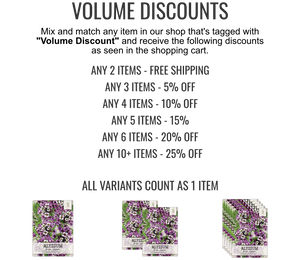Are you looking for a plant that will enrich your soil, shade your tender greens, provide an ongoing harvest, and add interest to your garden? Pole beans provide all of the above, and few varieties do it better than the Kentucky Blue pole bean.
Kentucky Blue pole beans are a cross between Kentucky Wonder and Blue Lake pole beans, longtime favorite varietals among home and commercial gardeners. Idaho horticulturist Calvin Lamborn recognized a demand for long, straight beans in the Asian market, and developed Kentucky Blue pole beans for this niche. His work with this variety earned the variety the prestigious All-America Selections National Award in 1991.
The original vertical garden
Six-foot vines repeatedly produce long, 6 to 8 inch, straight, bright green, sweet, crunchy pods of white beans. Kentucky Blues require structural support, provided by simple trellises or, depending upon the gardener's creative flair, elaborate pole structures.
The term "pole beans" originated with the use of simple wooden poles set in the soil to act as a support for vines. The rough surface of the wood poles allows the vines' suckers to cling.
Typically, these poles stood sentinel at the back of the garden so as not to block the rest of the vegetables' sunlight, but many gardeners have used pole beans to help shade tender vegetables such as lettuces in the hottest part of the season.
Some farmers traditionally grew a crop of pole beans after a corn harvest. Dry corn stalks support growing pole bean vines, and at the end of the season, the dried, crumbled vegetative matter from the legumes helped feed soil depleted by the heavier-feeding corn.
Thin bean poles arranged in a "teepee" shape provide shade for tender plants below, as well as visual interest in the garden.
A combination of the above methods is known among the Iroquois First Nation people as the "Three Sisters Garden". Corn is planted first, so the stalks have a head start. Then, beans are planted to grow up the stalks and help add nutrients to the soil. Sprawling squash plants helped keep the soil moist and cool from hot summer sun.
Beans climb best up wood's rough surface, but 4" mesh concrete reinforcement panels, easily found at hardware supply chains, help gardeners to get creative. Tie a couple panels into an archway to make an interesting shady spot in the garden or a hideout for younger green-thumbs.
Erect a wavy, vertical screen of mesh for some whimsy, and add companion vines such as nasturtium, which help repel insect pests.
From the garden to the kitchen
A packet of Kentucky Blue pole beans will keep you and your family—and your neighbors and their families—picking and eating beans right up to first frost. These heavy, continuous producers are a hit with kids, and since the bounty begins about 58 days from seed, successive planting and quick results ensure continuous delight throughout the season.
Kentucky Blue pole beans are stringless, and with a quick rinse can be steamed, stir-fried, grilled or eaten fresh.
Freeze them after a quick blanching, or dig up your grandmother's pickling recipe to enjoy these crisp, flavorful pods year-round.
The best gardens come from the freshest seeds
Make sure your garden gets off to the best start with high-quality seeds packed for this season or next season's use. Browse the site for our wide selection of non-GMO, heirloom, and open pollinated seeds. Whether you're a patio farmer or market gardener, Seed Needs will help you, your garden and your family thrive this season!
Sowing The Seed
Beans are not fond of being transplanted and are best established directly outdoors, when the weather is warm and all danger of frost has passed. If they are started indoors, the use of peat pots may be beneficial to prevent root shock when transplanting. Work through your sowing area to remove all unwanted plant life and weeds. Sow the seeds at a depth of 1” under topsoil. Provide a trellis or support.
Growing Conditions
Beans will require an area of full sunlight for the majority of the day. The plants will thrive in temperatures of at least 65F and require a soil that is fertile and rich in organic matter. You must also make sure that your sowing medium is well drained as well. Adding a light compost to any areas containing hard, compact soil will improve your overall drainage. Water the seeds daily until germination occurs.
Germination & Growth
Kentucky Blue Beans typically germinate within a good 7 to 21 days after sowing. The plants will reach a mature height of roughly 60 to 72 inches tall and can spread about 12 to 24 inches wide. They can be spaced roughly 18 inches apart from one another, in rows that are spaced 24 inches apart. Kentucky Blue will produce excellent yields of thick, 6 to 8 inch pods that can be harvested in 70 to 75 days. The use of stakes or a support trellis is recommended for healthy growth.



